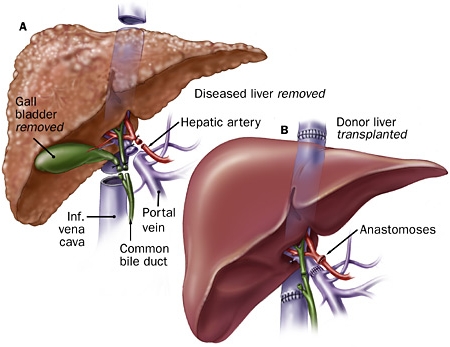Maintaining Liver Health
Whether or not you have existing liver diseases, you can take several steps to keep your liver healthy. These include getting regular medical care; avoiding alcohol, recreational drugs, and toxic substances; eating a healthy diet; engaging in moderate exercise; and taking measures to manage stress and fatigue.
Alcohol, Drugs, and Toxins
Heavy alcohol consumption can cause liver damage on its own, and is known to speed up liver disease progression in people with hepatitis B or C. It is not yet known whether light or moderate alcohol consumption is harmful to the liver. Many experts recommend that if you have hepatitis — and especially cirrhosis — you should not drink alcohol at all.
Certain prescription and over-the-counter medications, recreational drugs, herbal remedies, and vitamin and mineral supplements can be toxic to the liver (hepatotoxic), especially when taken in high doses or used in combination. Drug toxicity is more likely if you have existing liver disease. A damaged liver may have more difficulty processing medications, potentially leading to more serious drug side effects. Several anti-HIV drugs — in particular some of the protease inhibitors and non-nucleosides — are associated with increased liver enzyme levels and other signs of liver toxicity. Be sure to tell your healthcare providers about all drugs, herbs, and supplements you are using so they can be on the lookout for possible drug interactions.
Because the liver processes toxins, it is important to avoid substances that may harm the liver. Avoid exposure to toxic liquids and fumes including solvents, paint thinners, and pesticides. If it is necessary to use such chemicals, work in a well-ventilated area, cover your skin, and wear gloves and a protective face mask.
Diet and Exercise
A healthy, well-balanced diet is important for all people, with or without hepatitis or HIV disease. Such a diet is low in fat, cholesterol, and sodium, high in complex carbohydrates, and has adequate protein. Drinking enough fluid is also important — eight glasses of water per day is often suggested. Many experts recommend that people with liver damage avoid raw or undercooked shellfish (which may contain infectious organisms or toxins), processed or preserved foods (which may contain chemical additives), fruits and vegetables treated with pesticides, caffeine, and chocolate. High doses of vitamin A, vitamin D, iron, and niacin can be toxic to the liver. In some cases, people with advanced cirrhosis may be advised to limit their consumption of protein. Many people with hepatitis — as well as those with HIV disease — experience loss of appetite, nausea, vomiting, and diarrhea, sometimes as side effects of drugs. It may be helpful to eat small, frequent meals or snacks rather than three large meals each day, and to avoid spicy or fatty foods.
Healthy Liver Tips
|



